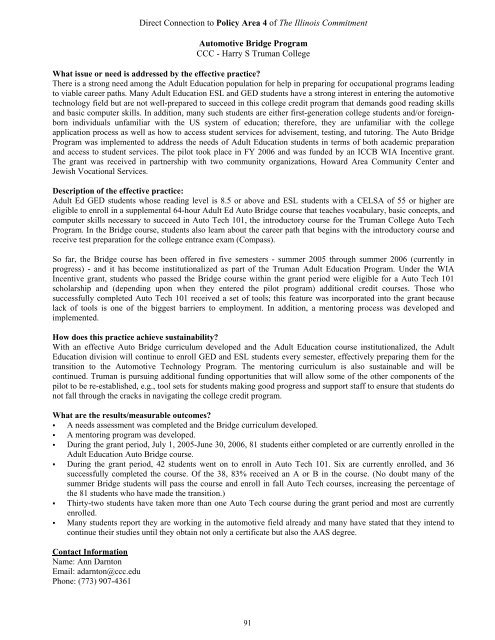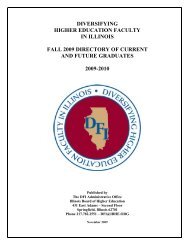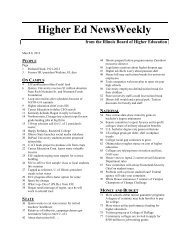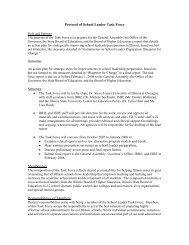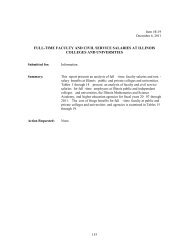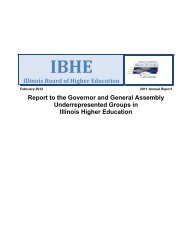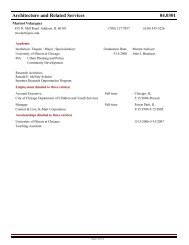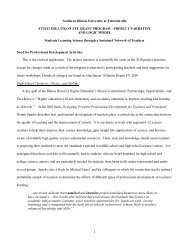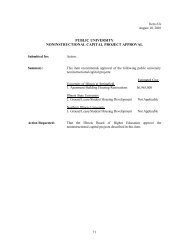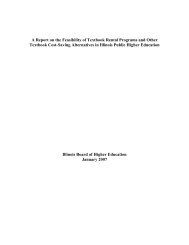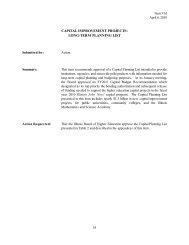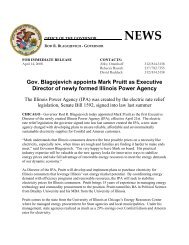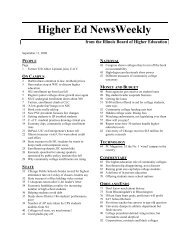Title of Effective Practice: - California Postsecondary Education ...
Title of Effective Practice: - California Postsecondary Education ...
Title of Effective Practice: - California Postsecondary Education ...
You also want an ePaper? Increase the reach of your titles
YUMPU automatically turns print PDFs into web optimized ePapers that Google loves.
Direct Connection to Policy Area 4 <strong>of</strong> The Illinois Commitment<br />
Automotive Bridge Program<br />
CCC - Harry S Truman College<br />
What issue or need is addressed by the effective practice?<br />
There is a strong need among the Adult <strong>Education</strong> population for help in preparing for occupational programs leading<br />
to viable career paths. Many Adult <strong>Education</strong> ESL and GED students have a strong interest in entering the automotive<br />
technology field but are not well-prepared to succeed in this college credit program that demands good reading skills<br />
and basic computer skills. In addition, many such students are either first-generation college students and/or foreignborn<br />
individuals unfamiliar with the US system <strong>of</strong> education; therefore, they are unfamiliar with the college<br />
application process as well as how to access student services for advisement, testing, and tutoring. The Auto Bridge<br />
Program was implemented to address the needs <strong>of</strong> Adult <strong>Education</strong> students in terms <strong>of</strong> both academic preparation<br />
and access to student services. The pilot took place in FY 2006 and was funded by an ICCB WIA Incentive grant.<br />
The grant was received in partnership with two community organizations, Howard Area Community Center and<br />
Jewish Vocational Services.<br />
Description <strong>of</strong> the effective practice:<br />
Adult Ed GED students whose reading level is 8.5 or above and ESL students with a CELSA <strong>of</strong> 55 or higher are<br />
eligible to enroll in a supplemental 64-hour Adult Ed Auto Bridge course that teaches vocabulary, basic concepts, and<br />
computer skills necessary to succeed in Auto Tech 101, the introductory course for the Truman College Auto Tech<br />
Program. In the Bridge course, students also learn about the career path that begins with the introductory course and<br />
receive test preparation for the college entrance exam (Compass).<br />
So far, the Bridge course has been <strong>of</strong>fered in five semesters - summer 2005 through summer 2006 (currently in<br />
progress) - and it has become institutionalized as part <strong>of</strong> the Truman Adult <strong>Education</strong> Program. Under the WIA<br />
Incentive grant, students who passed the Bridge course within the grant period were eligible for a Auto Tech 101<br />
scholarship and (depending upon when they entered the pilot program) additional credit courses. Those who<br />
successfully completed Auto Tech 101 received a set <strong>of</strong> tools; this feature was incorporated into the grant because<br />
lack <strong>of</strong> tools is one <strong>of</strong> the biggest barriers to employment. In addition, a mentoring process was developed and<br />
implemented.<br />
How does this practice achieve sustainability?<br />
With an effective Auto Bridge curriculum developed and the Adult <strong>Education</strong> course institutionalized, the Adult<br />
<strong>Education</strong> division will continue to enroll GED and ESL students every semester, effectively preparing them for the<br />
transition to the Automotive Technology Program. The mentoring curriculum is also sustainable and will be<br />
continued. Truman is pursuing additional funding opportunities that will allow some <strong>of</strong> the other components <strong>of</strong> the<br />
pilot to be re-established, e.g., tool sets for students making good progress and support staff to ensure that students do<br />
not fall through the cracks in navigating the college credit program.<br />
What are the results/measurable outcomes?<br />
• A needs assessment was completed and the Bridge curriculum developed.<br />
• A mentoring program was developed.<br />
• During the grant period, July 1, 2005-June 30, 2006, 81 students either completed or are currently enrolled in the<br />
Adult <strong>Education</strong> Auto Bridge course.<br />
• During the grant period, 42 students went on to enroll in Auto Tech 101. Six are currently enrolled, and 36<br />
successfully completed the course. Of the 38, 83% received an A or B in the course. (No doubt many <strong>of</strong> the<br />
summer Bridge students will pass the course and enroll in fall Auto Tech courses, increasing the percentage <strong>of</strong><br />
the 81 students who have made the transition.)<br />
• Thirty-two students have taken more than one Auto Tech course during the grant period and most are currently<br />
enrolled.<br />
• Many students report they are working in the automotive field already and many have stated that they intend to<br />
continue their studies until they obtain not only a certificate but also the AAS degree.<br />
Contact Information<br />
Name: Ann Darnton<br />
Email: adarnton@ccc.edu<br />
Phone: (773) 907-4361<br />
91


